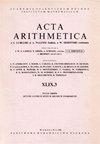塞尔伯格不规则密度筛
IF 0.5
3区 数学
Q3 MATHEMATICS
引用次数: 1
摘要
:我们研究塞尔伯格筛的某些方面,特别是当用相当薄的素数集进行筛选时。我们导出了特别适合这种设置的下界筛的新结果,并特别将其应用于在存在异常零的情况下给出算术级数中关于最小素数的Linnik定理的新的筛推证明。本文章由计算机程序翻译,如有差异,请以英文原文为准。
Selberg’s sieve of irregular density
: We study certain aspects of the Selberg sieve, in particular when sifting by rather thin sets of primes. We derive new results for the lower bound sieve suited especially for this setup and we apply them in particular to give a new sieve-propelled proof of Linnik’s theorem on the least prime in an arithmetic progression in the case of the presence of exceptional zeros.
求助全文
通过发布文献求助,成功后即可免费获取论文全文。
去求助
来源期刊

Acta Arithmetica
数学-数学
CiteScore
1.00
自引率
14.30%
发文量
64
审稿时长
4-8 weeks
期刊介绍:
The journal publishes papers on the Theory of Numbers.
 求助内容:
求助内容: 应助结果提醒方式:
应助结果提醒方式:


